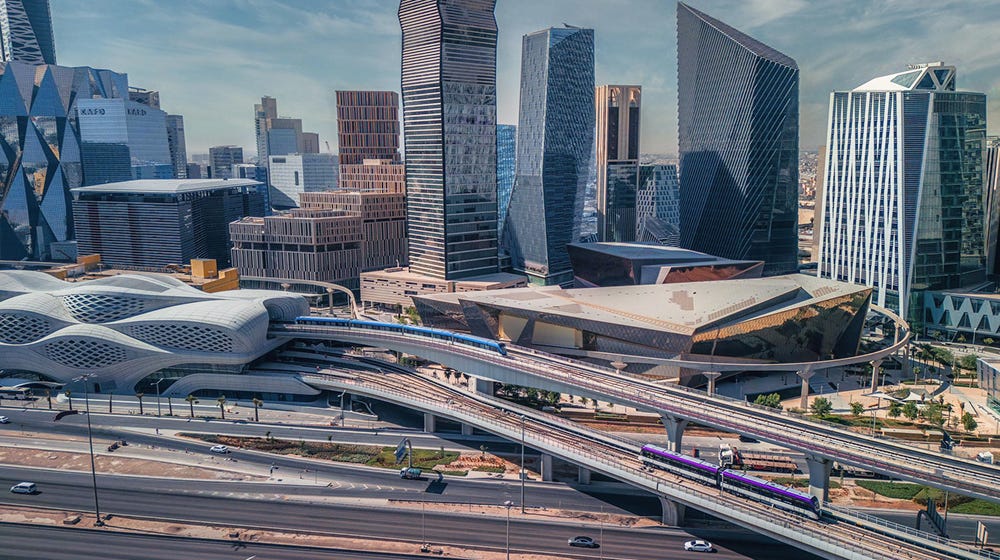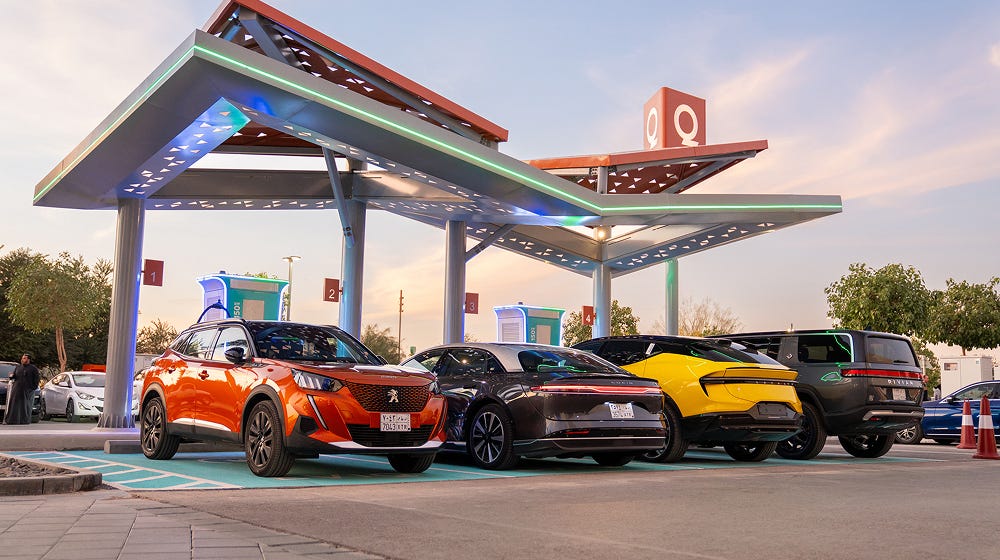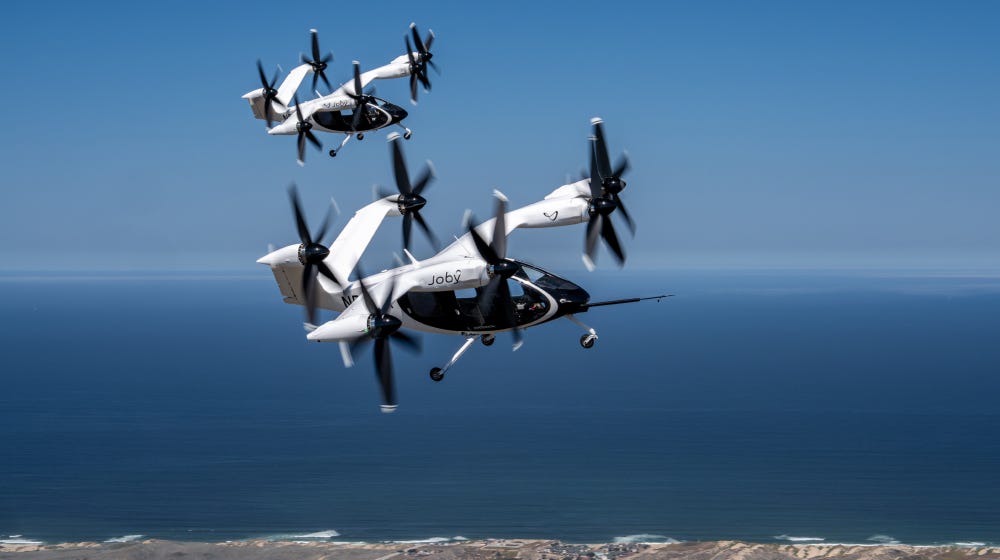The future of mobility is being written…in Riyadh.
You read that right. At first glance, Saudi Arabia’s dusty desert capital is defined by its sprawling urban landscapes, heavy traffic, and its seemingly endless freeways and overpasses. Yet, it is precisely against this backdrop of congestion and rapid expansion that Riyadh is fast becoming the epicenter of the global mobility revolution. Despite the current gridlock and sometimes unsightly sprawl, the capital of the world’s largest oil exporter is poised to transform itself into a true post-oil city of the future—one that will redefine how the world moves, connects, and envisions urban life.
And as the frenetic landscape of cranes and construction sites across the city demonstrates, Riyadh is moving quickly. While most cities grapple with limited resources and incremental progress, Riyadh benefits from a unique convergence: immense financial means, an unwavering appetite for technological advancement — and the ability to get things done. Every major decision, from infrastructure to investment, is now aligned with the goals of the Vision 2030 strategy, aiming to diversify the country’s economy and set it up for sustainable success in the 21st century. This is not a city adapting to change—it’s a city leading it.
The newly-inaugurated Riyadh Metro, for example, is a testament to the city’s ambition. As the world’s longest driverless metro system, it stretches 109 miles, connecting six lines and 85 stations. Designed to transport 3.6 million passengers daily, the Metro is set to eliminate 250,000 car trips each day. Its advanced automation, electric trains, and seamless integration with a modern bus network—complete with air-conditioned shelters—signal a leap toward a smart, sustainable metropolis. The Metro alone is projected to cut CO2 emissions by 12.5 million tons annually, anchoring Riyadh’s commitment to a greener future.
Saudi Arabia recognized early on that mobility would be a key strategic driver of the 21st century global economy. The Public Investment Fund (PIF), one of the world’s largest sovereign wealth funds, made headlines in 2016 when it became one of Uber’s largest single investors — and Uber remains the fund’s largest U.S. holding. The PIF’s bold moves didn’t stop there: it invested billions in Tesla and is now nurturing a homegrown electric vehicle industry, CEER — and is financially backing EV maker Lucid. The private sector is equally dynamic. Abdul Latif Jameel has become a global force in advanced mobility, backing electric vehicle pioneers like Rivian, eVTOL manufacturer Joby, and robo-taxi innovator Verne. Meanwhile, ACWA Power has emerged as a renewable energy leader, further supporting the transition to sustainable transport.
Riyadh’s physical transformation is unprecedented. The city is building the world’s largest linear park, the Sports Boulevard, stretching 83 miles and promising a new era of active, green living. The $65 billion Diriyah Gate redevelopment is underway around the historic heart of the Al Saud dynasty in the northwest of the city, blending heritage with cutting-edge urbanism. Riyadh is also preparing to host the 2030 World Expo, the 2034 FIFA World Cup, and is a likely contender for the 2036 Olympic Games—each event a catalyst for further innovation and global engagement.
Riyadh’s ambitions extend above ground. The city is positioning itself as a launchpad for advanced air mobility, including flying taxis and drone delivery systems. Through real-world deployments, regulatory sandboxes, and international partnerships, Riyadh is accelerating the adoption of aerial mobility solutions—placing itself firmly ahead of the global curve.
But what truly sets Riyadh apart is its unique geopolitical role. Saudi Arabia is a vital bridge between East and West, maintaining close ties with both the United States and China. This openness fuels innovation and opens doors to cross-continental collaboration. Order an Uber in Riyadh, and you might be picked up in a Chinese-made Changan Alsvin or a Geely Emgrand — new symbols of the city’s global connectivity and forward-thinking approach.
All these factors make Riyadh the natural choice to convene the world’s mobility leaders and innovators. CoMotion GLOBAL’s decision to host its inaugural global gathering in Riyadh is a recognition of this extraordinary momentum. With the support of visionary institutions like the Ministry of Transport and Logistics Services and the Public Investment Fund, Riyadh is not just participating in the global mobility conversation—it is hosting it: the future is being built, tested, and launched in Riyadh. And the world is invited to join.
Supported by SCEGA
The Saudi Conventions & Exhibitions General Authority (SCEGA) is the Kingdom’s national steward for the Business Events (BE) industry, entrusted with transforming Saudi Arabia into a global hub for meetings, incentives, conferences, and exhibitions. As a catalyst for sector growth and innovation, SCEGA drives investment, fosters international partnerships, and champions knowledge exchange across the global BE ecosystem. Through strategic initiatives, research sponsorships such as its patronage of UFI studies, and its leadership in hosting marquee events, SCEGA positions Saudi Arabia at the forefront of the global events industry—supporting Vision 2030 and redefining the role of business events in economic development.
CoMotion GLOBAL: Key Industries & Themes
Hydrogen & Alterative Fuels
Smart Infrastructure
Next-gen Batteries
Policy Innovation
Micromobility & Active Mobility
Automotive OEMs
Vertiports / Future Airports
AI Technologies
Autonomous Mobility
Sustainable Maritime
In-vehicle Technologies
Cybersecurity & Mobility
Be the first to know about the upcoming event and pre-sale tickets. Sign up now!
“Saudi Arabia is fast emerging as an important global hub of mobility innovation and CoMotion GLOBAL taking place in Riyadh will serve to further cement this role. Such an important global gathering of mobility leaders will undoubtedly be a magnet for the world's top mobility innovators. The opportunity to come together in this moment to continue to chart a better, more sustainable mobility future is significant.” - Hassan Jameel.
Saudi Arabia in the News
Let’s take a look at some of the biggest mobility stories coming out of Saudi Arabia:

A massive autonomous Metro system: It only took Riyadh 10 years and $22 billion to build a six-line, 109-mile Metro system that debuted in December. The fact that it’s the world’s longest autonomous rail system is just the cherry on top. It’s a sharp contrast with the state of transit in the U.S., where cities can spend decades –– and many billions –– dithering about small extensions of century-old rail lines. After only three months of existence, the Riyadh Metro had recorded 25 million boardings –– approaching the ridership of rail systems in Chicago and Boston.

A state-run EV charging company: In late 2023 the kingdom’s sovereign wealth fund teamed up with Saudi Electricity Company, a private company in which the government is a majority shareholder, to launch the Electric Vehicle Infrastructure Company. EVIC’s goal is to deploy more than 5,000 fast-charging stations at over 1,000 locations across the Kingdom by 2030.
Betting big on lithium: At the beginning of the year Saudi Arabia’s oil giant Saudi Aramco and state-owned mining company Ma’aden launched a joint venture to begin commercial lithium production by 2027, pioneering technology to extract the mineral from oilfield brine.
Building business with BYD and Tesla: In the spring Aramco entered a joint development agreement with Chinese EV maker BYD to explore new vehicle technologies, including advanced powertrain concepts. At the same time, Tesla announced plans to begin building out a Supercharger network in the kingdom.
A massive urban greening effort: In 2019 Riyadh launched a $32 billion series of mega-projects aimed at turning the hot, car-centric metropolis into one of the world’s most livable cities. Here are the four projects:
Green Riyadh: An urban landscaping initiative that will plant over 7 million trees.
King Salman Park: A redevelopment of the old air base in central Riyadh into one of the world’s largest parks –– it will be five times the size of New York’s Central Park.
Sports Boulevard – A sprawling linear park that will eventually stretch 135 km (83 miles).
Riyadh Art: An ongoing project to integrate more than 1,000 pieces of art into the city’s public spaces.

Flying into the air taxi future: The kingdom is moving aggressively to become a global aviation hub. That includes pouring $100 billion into beefing up traditional aviation infrastructure, as well as making big investments in urban air mobility. Abdul Latif Jameel is now collaborating with Joby Aviation to launch air taxis.
Partnership opportunities
CoMotion GLOBAL, CoMotion MIAMI, CoMotion LA, and the Monaco Hydrogen Alliance offer unparalleled opportunities to grow global awareness in the mobility space. Build influence, elevate your brand, and connect with ground-breaking companies. Let’s collaborate.
YouTube | LinkedIn | Podcast | X | Instagram









